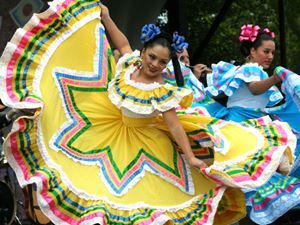
Cinco de Mayo is a very misunderstood holiday. Much of this has to do with popular culture. On May 5th, bars and restaurants around the U.S. will celebrate with mariachis, sombreros and plenty of Mexican beet and tequila. But what many people don’t know is that the 156-year-old holiday was created by California Latinos opposed to slavery and the Confederacy.
Cinco de Mayo commemorates the anniversary of an early victory by Mexican forces over French forces in the Battle of Puebla de Los Angeles in east central Mexico on May 5, 1862. At the time, a vastly outnumbered army of indigenous Mexicans defeated 6,000 better equipped French troops, ultimately leading to the French withdrawal from Mexico in 1867. It is believed that the origins of Cinco de Mayo celebrations lie in the responses of Mexicans living in California in the 1860s to French rule in Mexico at that time.
One of the largest Cinco de Mayo celebrations takes place in cities of Los Angeles, in addition to San Jose, San Francisco, San Antonio, Sacramento, Phoenix, Albuquerque, Denver and El Paso in the U.S.’s south-western regions. In these cities, a large portion of the population has Mexican origins. The first celebrations of Cinco de Mayo took place in California in 1863 as a way to honor the brave Mexicans who fought heroically against the French in the battle day. It’s important to keep in mind that the U.S. was engaged in the Civil War at the time of the Battle of Puebla. From this, we can see that a Mexican defeat of the French helped to keep them from becoming involved and supporting the Confederate Army.
On Cinco de Mayo, there is a huge street fair as well as smaller celebration in different neighborhoods, in Los Angeles in particular.
Contrary to popular belief, Cinco de May is not Mexican Independence Day. This is held on September 16th. It also isn’t the anniversary of the defeat and expulsion of the French forces by the Mexicans, which occurred in 1867. The holiday is primarily celebrated in only one of Mexico’s 31 states and more popular in America than in Mexico. One of these reasons is because as a holiday, its origins are here.
“Mexicans are usually surprised by the magnitude of the celebrations of Cinco de Mayo in the United States,” said Margarita Sanchez, a former journalist from Colombia who is now a Spanish professor at Wagner College. “…That victory proved to the Mexican people that it was possible for them to stand up to and defeat foreign invaders.”
The celebration expanded across the U.S. as American immigrants from Mexico and their descendants have settled more widely across the country.
For them, Cinco de Mayo symbolizes freedom, the desire to keep an identity and a soul,” Sanchez said. “Even if many in the United States don’t understand the historical background, it is an opportunity to celebrate the rich contributions made to America by the heritage of Mexican culture in this country.”
The holiday has been widely criticized by some Latino leaders and activists who see the day as overly commercialized. The real reason this happened is because the corporate marketplace started pushing Cinco de Mayo as an all-day happy hour when it recognized the demographic growth of the Latino population in the 1980s. They believed that advertising, promotion and sponsorship of Cinco de Mayo events would help them tab into the young consumer market. Alcohol and beer companies were the ones that pushed this heavily, spending millions on marketing the holiday.
Some consider it to be a Mexican-themed version of St. Patrick’s Day that often plays on racial stereotypes. Often times the celebrations become less about the cultural appreciation of the Mexican community and instead the holiday becomes more about drinking and partying especially by non-Mexican individuals. In turn, the holiday is often full of cultural appropriation. Many people will wear giant fake mustaches, sombreros or serapes they’ve purchased from party stores. Some even go as far as doing silly, disrespectful voices. This not only mocks Mexican culture, but also perpetuates offensive stereotypes. Not cool.
Cinco de Mayo is a great time to celebrate and learn more about Mexican history and culture. If you want to celebrate the day the right way, brush up on the history of the holiday. Do more research on the Battle of Puebla and Mexican-American-heritage. Learn about prominent Mexican-Americans or read some classic Mexican literature. If you go out, visit a non-chain Mexican restaurant where you can get authentic Mexican food and support small business. Throw a party and listen to traditional Mexican music.

